This year witnessed the outbreak of coronavirus at the beginning of February in India. Prime Minister of India, Mr Narendra Modi, created the PM Cares Fund in March 2020 to help people of the country fight this virus. This fund uses the money to combat, contain and for relief efforts against coronavirus and similar pandemic situations in the future. Prime Minister is the Chairman of this fund and trustees include the Minister of Defence, Minister of Home Affairs and Minister of Finance of the Government of India.
National Disaster Response Fund (NDRF) is constituted under Section 46 of the Disaster Management Act, 2005 (referred to as Act) for meeting any threatening disaster situation in the country. NDRF meets the expenses for emergency response, relief and rehabilitation in consultation with the National Authority according to the guidelines laid down by the Central Government.
Both the PM Cares Fund and NDRF are currently providing relief in dealing with the coronavirus situation in India. A Public Interest Litigation (PIL) was filed before the Supreme Court of India by Centre for Public Interest Litigation for directing Union of India to utilise NDRF to fight coronavirus and to credit all contribution from individuals and institutions to NDRF and not to PM Cares Fund. It also sought to transfer the funds of the PM Cares Fund to NDRF. On Tuesday, the Supreme Court dismissed this PIL by stating that funds of PM Cares Fund are not transferable to NDRF.
Also Read: Over 300 items likely to undergo revision in the basic customs duties
The Supreme Court explained its reasons for dismissing the PIL in detail. It held that the PM Cares Fund is a public charitable trust and not a government fund. The contributions by individuals and institutions to the PM CARES Fund is utilised for the public purpose and fulfilment of objectives of the trust. The nature of PM Cares Fund and NDRF is different as one is a public charitable trust, and the other is a fund established under an Act. The PM Cares Fund does not receive money from any budget or government money, whereas Parliament allocates money towards NDRF.
Further, NDRF’s objective is to provide relief in national disasters which is not for a specific disaster but encompasses all the disasters in the country. It includes floods, landslides, earthquakes, droughts and now coronavirus. PM Cares Fund aims to assist in public health emergencies.
As containing coronavirus requires immediate development in the infrastructure of medical health, PM Cares Fund came into being to have the necessary financial resources to meet this emergency. It mainly provides relief to combat coronavirus and any such virus which arrives in future. Thus, the NDRF and PM Cares Fund have different purposes and objectives.
The Supreme Court further held that there is no restriction for individuals or institutions to contribute directly to NDRF under the Act. Any person willing to donate to NDRF can do so under Section 46 of the Act. Similarly, any person or institution can voluntarily contribute to the PM Cares Fund. It is the choice of the individual or institution to donate to anyone or both funds.
The Supreme Court dismissed the petition stating funds collected in the PM CARES Fund are funds of public charitable trust and entirely different funds from NDRF. Thus, there is no occasion for issuing any direction to transfer the said funds to the NDRF.
For any clarifications/feedback on the topic, please contact the writer at mayashree.acharya@cleartax.in

I am an Advocate by profession. I interpret laws and put them in simple words. I love to explore and try new things in life.





